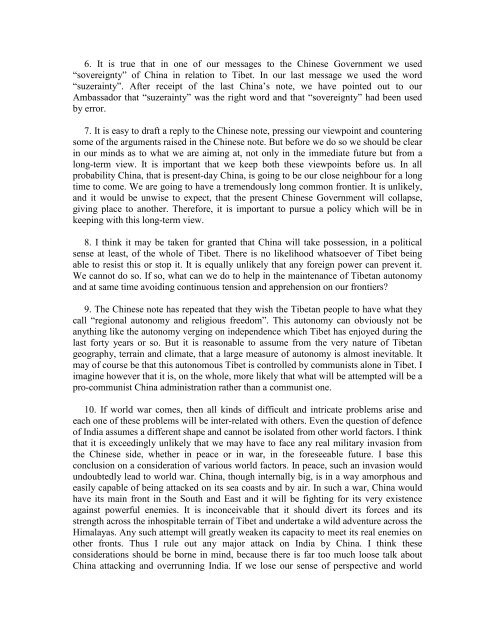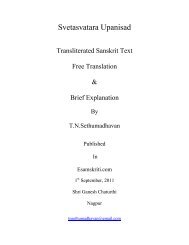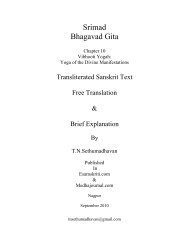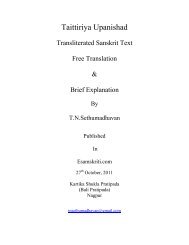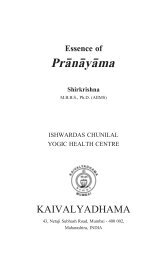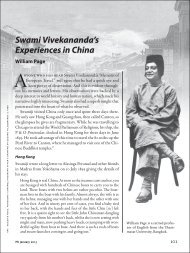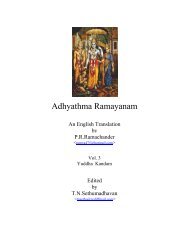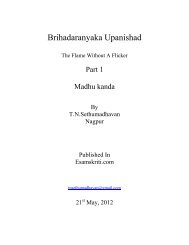SARDAR VALLABHBHAI PATEL Balraj Krishna - Esamskriti.com
SARDAR VALLABHBHAI PATEL Balraj Krishna - Esamskriti.com
SARDAR VALLABHBHAI PATEL Balraj Krishna - Esamskriti.com
- No tags were found...
Create successful ePaper yourself
Turn your PDF publications into a flip-book with our unique Google optimized e-Paper software.
6. It is true that in one of our messages to the Chinese Government we used“sovereignty” of China in relation to Tibet. In our last message we used the word“suzerainty”. After receipt of the last China’s note, we have pointed out to ourAmbassador that “suzerainty” was the right word and that “sovereignty” had been usedby error.7. It is easy to draft a reply to the Chinese note, pressing our viewpoint and counteringsome of the arguments raised in the Chinese note. But before we do so we should be clearin our minds as to what we are aiming at, not only in the immediate future but from along-term view. It is important that we keep both these viewpoints before us. In allprobability China, that is present-day China, is going to be our close neighbour for a longtime to <strong>com</strong>e. We are going to have a tremendously long <strong>com</strong>mon frontier. It is unlikely,and it would be unwise to expect, that the present Chinese Government will collapse,giving place to another. Therefore, it is important to pursue a policy which will be inkeeping with this long-term view.8. I think it may be taken for granted that China will take possession, in a politicalsense at least, of the whole of Tibet. There is no likelihood whatsoever of Tibet beingable to resist this or stop it. It is equally unlikely that any foreign power can prevent it.We cannot do so. If so, what can we do to help in the maintenance of Tibetan autonomyand at same time avoiding continuous tension and apprehension on our frontiers?9. The Chinese note has repeated that they wish the Tibetan people to have what theycall “regional autonomy and religious freedom”. This autonomy can obviously not beanything like the autonomy verging on independence which Tibet has enjoyed during thelast forty years or so. But it is reasonable to assume from the very nature of Tibetangeography, terrain and climate, that a large measure of autonomy is almost inevitable. Itmay of course be that this autonomous Tibet is controlled by <strong>com</strong>munists alone in Tibet. Iimagine however that it is, on the whole, more likely that what will be attempted will be apro-<strong>com</strong>munist China administration rather than a <strong>com</strong>munist one.10. If world war <strong>com</strong>es, then all kinds of difficult and intricate problems arise andeach one of these problems will be inter-related with others. Even the question of defenceof India assumes a different shape and cannot be isolated from other world factors. I thinkthat it is exceedingly unlikely that we may have to face any real military invasion fromthe Chinese side, whether in peace or in war, in the foreseeable future. I base thisconclusion on a consideration of various world factors. In peace, such an invasion wouldundoubtedly lead to world war. China, though internally big, is in a way amorphous andeasily capable of being attacked on its sea coasts and by air. In such a war, China wouldhave its main front in the South and East and it will be fighting for its very existenceagainst powerful enemies. It is inconceivable that it should divert its forces and itsstrength across the inhospitable terrain of Tibet and undertake a wild adventure across theHimalayas. Any such attempt will greatly weaken its capacity to meet its real enemies onother fronts. Thus I rule out any major attack on India by China. I think theseconsiderations should be borne in mind, because there is far too much loose talk aboutChina attacking and overrunning India. If we lose our sense of perspective and world


